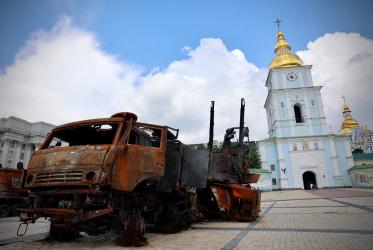The 2016 WCC Central Committee concluded its third day with an afternoon prayer service in one of Trondheim’s most beautiful churches. Built in 1715, the Bakke Church, with its remarkable architecture and artistry, is one the oldest buildings in the Bakklandet area of Trondheim.
On the eve of Friday, 24 June2016, more than 100 participants gathered, from all around the world, for prayers at the Bakke Church in Trondheim, a city known as an important Christian pilgrimage site.
The service at the Bakke Church, which is home to both Lutheran and Eastern Orthodox Church congregations, was graced by various church traditions originating from over 50 countries, reinforcing the commitment of the churches to strengthen their voices of unity, justice and peace.
Songs of praise and gratitude echoed throughout the church’s quiet surroundings, as diverse voices from many landscapes, united in harmony and in conviction and hope, affirmed messages of unity, justice and peace.
Worshipers rose in prayer, committing to continue working together and healing one another on the pilgrimage of justice and peace. The pilgrimage is an initiative of the WCC member churches “to work together in a common quest, renewing the true vocation of the church through collaborative engagement with the most important issues of justice and peace, healing a world filled with conflict, injustice and pain.”
For many who attended, the prayers marked a truly historic moment, as church members representing diverse cultures and languages came together to revitalize the spirit of unity and the pilgrimage of justice and peace.
Rabbi David Fox Sandmel, director of Interfaith Affairs for the Anti-Defamation League, who is participating in the Central Committee meetings, said that it was “impressive to hear so many people praying together in so many languages.” This cultural diversity through common faith fosters an appreciation of beauty and compassion.
For Ingrid Mortenson Bjornstad, an active volunteer with Amnesty International, the service represented important values of “inclusivity and engagement,” noting that “different people were actively participating in worship in their own languages.” With such diversity in unity, the worship itself represents a moment when bridges of understandings are built through doctrine and dialogue.
For others, the service was a moment for reflection. Rev. Dr Odair Pedroso Mateus, professor of ecumenical theology at the Ecumenical Institute at Bossey and WCC director of Faith and Order, described it as an expression of the “universal church, singing songs from Egypt to Kenya, together with people from all parts of the world.”
For more information:







